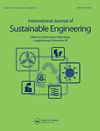轮胎工业生产可持续性评估综合方法:印度尼西亚案例研究
IF 3.6
Q3 GREEN & SUSTAINABLE SCIENCE & TECHNOLOGY
International Journal of Sustainable Engineering
Pub Date : 2023-11-18
DOI:10.1080/19397038.2023.2276936
引用次数: 0
摘要
摘要 本研究结合三重底线(TBL)概念,提出了一种评估可持续制造绩效的新方法。研究纳入了各种新型指标,包括机器性能、体力负荷和脑力负荷。此外,对可持续生产的评估还考虑了生产过程中分配给每个工作站的工作量。本研究采用了德尔菲法、层次分析法(AHP)、可持续价值流图(SVSM)和交通灯系统(TLS)。德尔菲法用于评估相关指标。同时,利用层次分析法(AHP)评估 TBL 和工作站指标的重要性。采用 SVSM 和 TLS 技术绘制 TBL 指标图。利用指标、工作站权重和指标效率计算出制造业可持续发展指数 (MSI) 分数。此外,还提供了印度尼西亚轮胎行业的案例研究。轮胎行业的 MSI 结果显示其绩效得分率为 85.52%,这表明该行业的绩效需要改进。本研究的结论具有研究意义,因为它们有助于推进可持续制造绩效评估理论的发展。此外,本研究还为轮胎企业提高可持续生产绩效提供了管理建议。本文章由计算机程序翻译,如有差异,请以英文原文为准。
An Integrated method for manufacturing Sustainability assessment in tire industry: a case study in Indonesian
ABSTRACT This study presents a novel approach for evaluating the performance of sustainable manufacturing by integrating the Triple Bottom Line (TBL) concept. The research incorporates various novel metrics, including machine performance, physical load, and mental load. Additionally, the evaluation of sustainable manufacturing takes into account the workload assigned to each workstation in the production process. This research utilizes the Delphi approach, Analytical Hierarchy Process (AHP), Sustainable Value Stream Mapping (SVSM), and Traffic Light System (TLS). The Delphi method is employed to assess pertinent indicators. Meanwhile, the Analytic Hierarchy Process (AHP) is utilized to evaluate the importance of the TBL and workstation indicators. The SVSM and TLS techniques were employed to chart the TBL indicators. The Manufacturing Sustainability Index (MSI) scores were computed using indicators, workstation weights, and indicator efficiency. Additionally, a case study is provided on the tire sector in Indonesia. The tire industry's MSI findings showed a performance score of 85.52%, signifying the need for improvement in performance. The findings of this study have research implications as they contribute to the advancement of theory in evaluating sustainable manufacturing performance. Furthermore, this study offers managerial recommendations for the tire business to enhance sustainable production performance.
求助全文
通过发布文献求助,成功后即可免费获取论文全文。
去求助
来源期刊

International Journal of Sustainable Engineering
GREEN & SUSTAINABLE SCIENCE & TECHNOLOGY-
CiteScore
7.70
自引率
0.00%
发文量
19
 求助内容:
求助内容: 应助结果提醒方式:
应助结果提醒方式:


